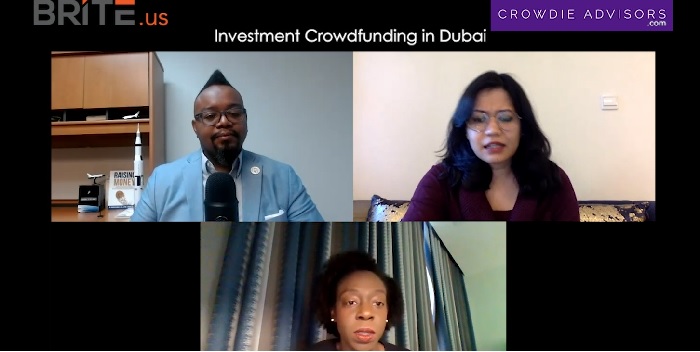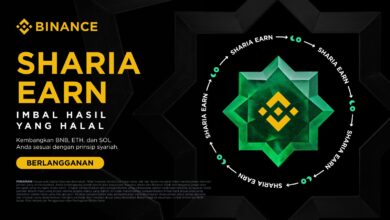A Comparative look into Crowd Funding in USA versus UAE

Crowd funding has become a popular way for startups, entrepreneurs and companies to raise money for launching or growing their businesses. By the year 2020 crowd funding platforms had raised $34 billion worldwide with 50% of that coming from North America at $17.2 billion raised. As per statistics an individual crowdfunding campaign raises on average $568 million.
Recently Samson Williams, Founder of Brite.us in the USA moderated a three series webinar to take a look into the similarities and differences between crowd funding in the USA in comparison with the UAE. Participating in the mini webinar series were Crowdie Advisors from USA and KARM Legal from UAE.
One of the first things discussed was the differences between regulations for crowd funding in the USA versus UAE.
What is the difference between Crowdfunding in USA versus UAE?
Akshata Namjoshi, Fintech lead at KARM legal explained how crowd funding works in the UAE. As per Namjoshi one of the most important differences between the USA and UAE, is that in the UAE you have mainland jurisdictions and regulations as well as those in free zone areas. Presiding over regulations in the mainland is UAE SCA (Securities and Commodities Authority) while free zone jurisdictions include both ADGM (Abu Dhabi Global Market) and DIFC (Dubai International Financial Centre). Each of these entities has different rules and regulations for crowdfunding.
Namjoshi elaborates, “For example in DIFC you have regulations similar to that of the UK and USA when it comes to crowd funding regulation, in ADGM they don’t focus on crowd funding but rather on private financing platforms for professional investors. Most recently the UAE SCA has put in place regulations for fund raising platforms for equity investment, commodities and so forth.” As per Namjoshi the closest to the crowd funding of the USA is in DIFC where startups and companies are able through equity crowd funding to raise up to 5 million USD. However retail investors can only invest up to 50,000 USD per year, but startups and companies can also raise money from professional investors as well.
When it comes to the US market, Maurine Murat, Equity and debt crowd funding at Crowdie Advisors explains, “In the USA crowd funding rules are national and regulated by the SEC (Securities and Exchange Commission) with oversight as well from FINRA (the Financial Industry Regulatory Authority). Companies that want to raise money have to be a member of FINRA and registered at SEC.”
When it comes to the amount that companies and startups can raise using crowd funding platforms Murat states, “Before Feb 2021 it was 1 million 70 thousand dollars, but with new legislation effective in February of 2021 the amount that can be raised is now 5 million USD”
She adds, regular investors can invest either up to 5% of their income or 2500 USD per year. As for accredited investors they can invest no more than 107,000 USD in a campaign but are allowed to invest in multiple crowd funding campaigns. With the new REG A+ there are no restrictions of the amount that can be invested and the US has introduced new accreditation rules to make it easier for investors to receive accreditation such as having a securities license, education, having worked in VC fund etc…”
What do crowd funding and issuers need to do and spend?
In the UAE as per Namjoshi, the first thing startups and companies need to do is acquire a license for a crowd funding platform whether from DIFC, ADGM, or SCA which costs anywhere between 25,000 USD to 40,000 USD, and a 140,000 USD for base capital since crowd funding platforms are considered a category 4 license for example in DIFC and finally there are a lot of requirements when it comes to disclosure KYC/AML.”
In the USA if you are an issuer that wants to raise money on a regulated crowd funding platform you have to be a registered entity in the USA. Once that is done, you have to submit Form C to SEC, then you have to apply to a platform, and crowd funding platforms have application process. In terms of cost, some platforms will charge certain fees for assisting with Form C and any other documentation. It costs between 16,000 to 300,000 USD to raise up to 5 million dollars.
What are the Regulations in USA versus UAE?
The REG A+ were finalized in 2015 as an update of the old Regulations A exemption which was costly and time consuming with State Blue Sky review., was made simpler and easier. The state review was removed for Tier II of Reg A+. REG A+ facilitates investment crowd funding for up to $50 million. Both accredited and non-accredited investors may participate in securities offers while Under Reg CF rules startups and companies can raise up to 5 million USD only. As per Maurine Murat, Equity and debt crowd funding at Crowdie Advisors in USA, “Currently Reg A + in the USA allows the raise of 50 million USD has been raised to 75 million as per new regulations.
In the UAE things differ according to Barkha Doshi, Senior Associate at KARM Legal with expertise in capital markets, security token offerings, Fintech, and crowd funding, “There are no REG A+ exemptions in the UAE, you can raise under the TIER 1 Band 20 million USD and under the TIER 2 band you can raise 75 million USD. The UAE doesn’t have a mini IPO system, so you either go for a REG CF which is a crowd funding under either an investment crowdfunding or a loan base crowd funding and most popular here is property based crowd funding or you do an exempt offering which is an offering dedicated to professional investors equal to an accredited investor in the USA or you go for a public offering.” The most popular in the UAE according to Doshi are exempt offerings in free zones such as ADGM ( Abu Dhabi Global Markets) or DIFC ( Dubai International Financial Center).
At the moment however, Americans cannot invest in projects that come out of the UAE. However the regulators are starting to open up bridges for cross border investments and work with regulators across the globe to allow investment into these IPOS or exempt offerings. Doshi believes the UAE is the next hub for this.
When it comes to the USA Maurine Murat explains, “There is Reg A and Reg A+ for Tier 1 and Tier 2 . Rega A+ is the expanded or amended version of Reg A. The Reg A+ is considered as a mini IPO where you are not going for a public offering but it has some flexibility that mirrors launching an IPO. So under Tier 1 you can raise up to 20 million and under Tier 2 up to 50 million which has been amended to 75 million.”
In both the main difference is that companies can raise their funds on their own platform while being regulated by SEC. Just like an IPO you are allowed to issue shares and stocks to both accredited and non-accredited investors and even those not in the USA subject to proper KYC and AML checks. Murat explains, “This gives the average person an opportunity to invest.”
What happens after raising funds in USA versus UAE?
In the UAE Doshi explained that after raising funds, startups and companies have to make sure they carried out all the proper KYC and AML because regulators are tough in the UAE. They also as per her recommendation need to continue to update the technology of the crowd funding platform and make it easy to invest. Most importantly regulators will want details into the remuneration process such as how dividends will be structures, whether they are tokens or other forms.
As per Murat, she explains that the top three things is get down to carrying out the real business and start working on the objectives set in place when the entity raised the money, such as scaling the business, finding customers, or selling products. In essence run your business.





